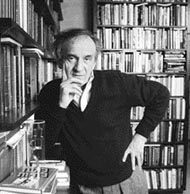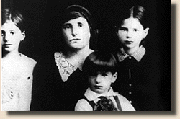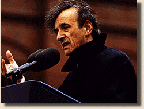|
Elie Wiesel was born in Sighet,
Transylavaina on September 30,1928. He was the only son of four kids
in a Jewish community. He was able to read and write. He was
educated by Hebrew studies.
In 1944 his village was
taken over by the Nazis. When he was fifteen years of age he was sent
to the concentration camp Auschwitz. He was separated from his mother
and three sisters. He had to stay
with his father.
His father died during the
first the mouths of the war.
He was told that his mother and sisters died in the gas chambers, he
never saw them again. After that he
was sent to three more concentration camps, Buna, Buchenwald, and
Gleiwite. Later he found out that
both of his older sisters were alive, but he couldn’t find out where they
were. The camp Buchenwald was
liberated in April 1945. A couple years after he got out of it.
In 1949 he got out of the concentration camps, he had to go to
an orphanage for a few years.
In 1948 he began to study
literature, philosophy, and psychology at the Sorbanne. He became a journalist and wrote for the
L’arche newspaper. During this time
he met Nobel Laureate Franes Mauriac. Mauriac
wanted him to talk about what he felt and what it was like in
the four concentration camps he went.
But it was to hard on him to talk about it.
In
1956 Elie Wiesel was involved in a motorcycle accident. After a year recovery he became a U.S. citizen.
In
1958 he published “Night.” It
penetrated the inside experience of Jews in the concentration camps. This moved so successfully it leads him
to write thirty-five additional works.
They were dealing with Judaism, the Holocaust, and the fight for
morality amongst the race.
Since
1976 he has served as an Andrew Mellon Professor of Humanities at Boston
University.
Jimmy
Carter (The President then) appointed him Chairman of the United States
Holocaust Memorial council in 1978.
He was also the Founding President of the Paris based Universal
Academy of Cultures.
In
1986 Elie won the Nobel Peace Prize.
He won it for his efforts on behalf of oppressed people worldwide
and for being chairman of “The Presidents Commission on the Holocaust.
When
he was in war he and many others didn’t believe in God. They thought that God could stop the
killing but he didn’t. So they gave
up all hope for survival. The
police beat the Jews and most were sent to the gas champers. When Elie was in line to go to work or
the gas chamber, he lied about his age so he could stay alive a little
longer for all he knew. He never
knew were his sisters had gone after the war, but he always wanted to find
them alive.
This
is what he said about believing in God.
He
said, “Why should I bless his name?
The eternal Lord of the Universe, the all powerful and Terrible, was
silent. What had I to thank him
for? There was no longer reason I
should fast, I am no longer accepted Gods silence. In the depths of my heart I felt void.”
Today
he believes in god but he still won't talk about how he, or all around him,
felt to anyone but maybe he wife and his child.
Elie
Wiesel has 40 books out and his best seller or best published is
“Night.” He also has a lot of poems
and a lot of quotes.
He
said, “Sometimes we must interfere, when human lives are endangered, when
human dignity is in jeopardy, national borders and sensitive become
irrelevant. Whenever men or women
or persecuted because of their race, religion, or political views that
place must –at that moment- become the center of the universe.” – Elie
Wiesel.
He
was a good author of a lot of books he wrote and said a lot of things that
are felt by many people. He had the
hardest task of going to four concentration camps, but he made it. I think that would be the hardest thing
to survivor, but he did to tell about it.
He doesn’t talk to people about because it must hurt to know that
your friend went to the concentration camps with you, but died in the gas
chambers. He wrote a lot of books
including, “Night,” “The Accident,” “Down,” “Evil and Exile,” and “The
Fifth Son.”
Today
he lives in New York City with his wife.
He is seventy-three years old.
|




